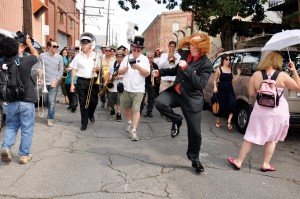 I was sitting at my desk working on this issue on a Saturday afternoon, when I heard some music coming my way. Since it was early in the day, I knew it wasn’t any of the clubs on Frenchmen, and it was moving, so I figured it was a parade. Whenever you hear a parade in the middle of the day in New Orleans, and it isn’t Mardi Gras, you can be pretty sure that it’s a second line parade. Sure enough, musicians and dancers and marchers holding placards of the late, great flautist Hart McNee made their way down Decatur from Elysian Fields, passed under my window, and turned right to make their way down Frenchmen Street. I ask you: where else can you find a raucous parade celebrating life (after death) but in New Orleans?
I was sitting at my desk working on this issue on a Saturday afternoon, when I heard some music coming my way. Since it was early in the day, I knew it wasn’t any of the clubs on Frenchmen, and it was moving, so I figured it was a parade. Whenever you hear a parade in the middle of the day in New Orleans, and it isn’t Mardi Gras, you can be pretty sure that it’s a second line parade. Sure enough, musicians and dancers and marchers holding placards of the late, great flautist Hart McNee made their way down Decatur from Elysian Fields, passed under my window, and turned right to make their way down Frenchmen Street. I ask you: where else can you find a raucous parade celebrating life (after death) but in New Orleans?
I believe that anyone who’s grown up in the city—or for that matter, anyone who’s tried to do business here—has a love-hate relationship with New Orleans. I see my friend and former co-worker Jim at Jazz Fest every year; his wife Kathy is an accomplished artist and has a booth at the fest every year. It’s really the only time we see each other to talk. This year we were both bitching about all the stuff that is wrong with New Orleans: the corruption, the ineptitude, the apathy, the crime problems. You know the drill, if you live here. But then Jim asked: “But where else would you rather live?” I knew that answer: nowhere else but here. Despite all the crap you have to deal with to live in New Orleans, there’s just nowhere else I’d rather live.
I used to think living in Manhattan would be really cool, but on many visits to the city I changed my mind. Too expensive. Too many people. And everything seems to be a hassle, from walking your dog, to going to the movies. But damn, I love that city! I just don’t see myself living there. People have that kind of relationship with New York and with New Orleans too. If you’re creative, this is the best place to be. If you’re going to starve in a city because you’re a creative type, I’d rather eat the local food and live in New Orleans.
I’ve called it the “velvet-lined rut” for a long time, and it’s true. Sometimes you feel as though you can’t take it anymore, and then you see a second line parade, and you get it.
Frenchmen Street is arguably the best street to hear live music in the world. I mentioned this in our “Weekly Beat” newsletter some weeks back, but it’s worth a saying it again: the American Society of Travel Writers voted New Orleans as the “best place to hear live music” in the country. Take that, Austin! But there are some nasty rumblings on Frenchmen Street these days. For those of you who haven’t experienced the rise of Frenchmen Street’s live music scene, it can be summarized like this: Frenchmen developed organically as a real “music street,” with venues like Snug Harbor, the Apple Barrel, the Spotted Cat, Blue Nile and d.b.a. presenting live music almost nightly. In some cases, the clubs weren’t zoned for live music, and the city’s (then) Music Office urged the City Planning Commission to establish a cultural district overlay zoning on the street that allowed only a certain number of bars (with and without music) and restaurant permits to be granted. Over time, others wanted to do live music. Problem is, there’s a limited number of music and bar permits available. So there are a few places on Frenchmen who are not operating legally.
I understand that the NOPD is starting to crack down on venues that are supposed to be restaurants but are operating as music bars. The Faubourg Marigny Improvement Association is adamantly opposed to any violations of the zoning laws. They don’t want Frenchmen to become another Bourbon Street. Personally, I don’t see a problem with allowing live local music on Frenchmen anywhere on the street. For a city that’s known for its live music, why is there a problem allowing live music to flourish on a street that’s obviously a good place to play—and for people to listen to—live music?
The answer always seems to be that music will bring in “undesirable” elements to the neighborhood (drunks, crime, trash, unwelcome noise, etc.). And it’s true; someone does need to police the street’s activities. But when Frenchmen first developed, who did the policing? The business owners on Frenchmen Street, not a neighborhood group whose first priority always seems to be residents, not businesses. Frenchmen Street needs its own business association, perhaps one that helps its members work their way through the bureaucratic and zoning problems in the city and negotiates with the neighborhood groups so that everyone can co-exist peacefully and profitably.
The same should be true for North Rampart Street. But that’s a whole other column.




